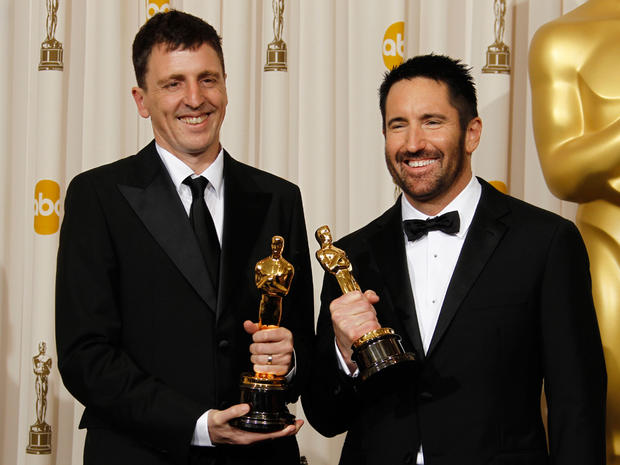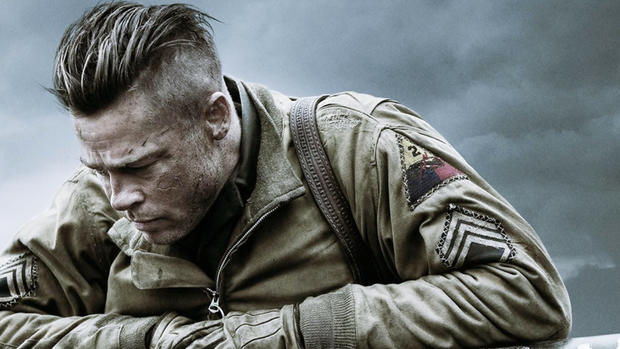Trent Reznor on the sonic world he created for "Gone Girl"
One of the eeriest parts of "Gone Girl," the new suspense thriller from David Fincher, is its music.
The score was co-written by Trent Reznor, lead singer of Nine Inch Nails and an award-winning composer.
He and his co-writer, Atticus Ross, won an Oscar for Best Original Music for the 2010 movie "The Social Network" and a Grammy the next year for "The Girl with the Dragon Tattoo."
The team paired with Fincher for a third time for the domestic thriller, based on the best-selling novel, about a husband blamed for the disappearance of his wife.
Reznor told CBS News that he paired with Fincher again because he finds score-writing to be both demanding and worthwhile.
"It's been just such a rewarding experience for me personally," Reznor said. "It's very challenging. It was flattering to be asked to work in a different medium than we're used to - film that is. And it was such a fun, rewarding, creative experience that when we finished 'Social Network' I said, 'Hey, if it's appropriate, call me for the next one.' That lead to 'Dragon Tattoo,' and here we are - 'Gone Girl.'"
Reznor said score-writing is a different process than songwriting for Nine Inch Nails because he's trying to capture the vision of the director and not necessarily his own.
"What I learned working in film is that my job is to be in service to the picture," Reznor said. "And if I'm writing for Nine Inch Nails, my end result is trying to get this idea I have in my head into your ears and make that connection. In film, we adopted this strategy of really trying to get inside David's head. He has a really clear idea of what he's looking for and the role of music in film."
Reznor said he wanted to build a score that complimented the ideas in the book and film as much as possible.
"In this case, read the book, read the script, spent a lot of time with David thinking about asking him what he was looking for," Reznor said. "What textures, not only sonically, but what was the role of music? How manipulative can we get with music? And then Atticus and myself, we just sit in a room, usually without the picture, just thinking about the characters, thinking about the feelings that were evoked by the script, thinking about what we learned from David and just generate some backdrops."
One major theme Reznor focused on musically is false appearances and deception.
"David and I talked a lot about the concept of appearances and facades and if we could create sonically something that might appear to be perfect and pleasant on the outside but have it sort of rot inside," Reznor said. "And the more it goes on, you start to realize that all is not what it appears, which comes up in a number of ways throughout the film."
Reznor said that instead of watching the raw film and writing tracks for each scene, he creates a larger musical palate first, which he and Fincher can take from when it comes time to add music.
"David asked me to work on 'Social Network,' which is the first film I'd ever scored, and I watch a lot of films, and I love David's work, but I didn't know the actual process of how you would go about scoring a film," Reznor said. "Do you wait till it's finished, do you--I just didn't know the mechanics behind the process. So we adopted a strategy that worked out pretty well, which is to kind of work from an almost impressionistic place: Learn the material, think about what might fit in that space, almost like set design, and run it by David to see how it feels, and that yielded some pretty great results and a strategy that ends up being a lot more work for us as composers because we aren't just composing the 42 minutes of music that's in a film. We're kind of designing a world that pieces can be extracted into what fits the film."
Reznor said that process resulted in three hours of music for "The Girl with the Dragon Tattoo."
"So with 'Dragon Tattoo,' we'd taken a whole year set aside just to think about that, "he said. "And as we got to know the editors and the process that David goes through, we thought maybe it'd be interesting to give music before things are actually filmed as it might influence the performances or some of the directorial decisions. And there were pros and cons to that approach, but it was an interesting experiment to try. The cons being we ended up writing three hours of music; we did about 10 times the work that we needed to."
"Gone Girl" is now in theaters. If you find yourself on the edge of your seat while watching, that may be due to its suspenseful plot, or maybe Reznor's music.

